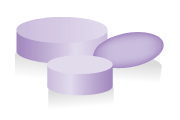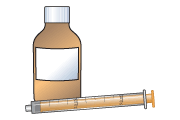Azathioprine for severe atopic eczema
This leaflet is for parents and carers about how to use this medicine in children. Our information may differ from that provided by the manufacturers, because their information usually relates to adults. Read this leaflet carefully. Keep it somewhere safe so that you can read it again.
Name of medicine
Azathioprine
Brand names: Imuran®
This leaflet is about the use of azathioprine for the treatment of severe atopic eczema.
Why is it important for my child to take azathioprine?
In severe atopic eczema, the immune system in the skin becomes ‘overactive’, which causes inflammation (redness and soreness).
Azathioprine belongs to a group of medicines called immunosuppressants. It works by helping to stop your child’s own immune system from attacking their skin. This reduces the inflammation.
What is azathioprine available as?
Tablets: 25 mg (orange), 50 mg (yellow); Imuran tablets contain lactose.
Liquid medicine can be ordered specially from your pharmacist; this may contain a small amount of lactose.
When should I give azathioprine
Azathioprine is usually given once a day. This is usually in the morning.
Give the medicine at about the same time each day so that this becomes part of your child’s daily routine, which will help you to remember.
How much should I give?
Your doctor will work out the amount of azathioprine (the dose) that is right for your child. The dose will be shown on the medicine label.
When your child’s eczema starts to improve, your doctor will reduce the dose gradually. Your doctor will explain what to do. Do not reduce the dose until your doctor has told you to.
It is important that you follow your doctor’s instructions about how much to give.
How should I give azathioprine?

Tablets
- Tablets should be swallowed with a glass of water, milk or juice. Your child should not chew the tablet. You can crush the tablet and mix it with a small amount of soft food such as yogurt, jam or mashed potato. Make sure your child swallows it straight away, without chewing.
- Wash your hands or use disposable gloves. Wash all equipment thoroughly after use to make sure that no particles or dust from the crushed tablets are inhaled or ingested.

Liquid medicine
Measure out the right amount using a medicine spoon or oral syringe. You can get these from your pharmacist. Do not use a kitchen teaspoon as it will not give the right amount.
Give azathioprine with a drink after your child has eaten.
When should the medicine start working?
It may take 2–3 months for azathioprine to work properly, so your child’s eczema may still be troublesome for a while. It is important that you continue to give azathioprine in the way you have been told to during this time, and to continue with any other treatments as your doctor has advised.
What if my child is sick (vomits)?
If your child is sick less than 30 minutes after having a dose of azathioprine, give them the same dose again.
If your child is sick more than 30 minutes after having a dose of azathioprine, you do not need to give them another dose. Wait until the next normal dose.
What if I forget to give it?
If you usually give it in the morning: Give the missed dose when you remember during the day, as long as this is at least 12 hours before the next dose is due.
If you usually give it in the evening: If you remember before bedtime, give the missed dose. You do not need to wake up a sleeping child to give them the missed dose. You can give the missed dose in the morning, as long as this is at least 12 hours before the evening dose is due.
What if I give too much?
You are unlikely to do harm if you give an extra dose of azathioprine by mistake. If you are concerned that you may have given too much, contact your doctor or local NHS services (call 111 in England and Scotland; 111 or 0845 4647 in parts of Wales) or take your child to hospital. Have the medicine or packaging with you if you telephone for advice.
Are there any possible side effects?
We use medicines to make our children better, but sometimes they have other effects that we don’t want (side effects).
Side effects you must do something about
If your child gets flu-like symptoms, sore throat, or unusual bleeding or bruising, contact your doctor, as there may be a problem with your child’s blood.
If your child starts being sick every few hours, has stomach pains, is very sleepy or has jaundice (the skin or eyes look yellow), take them to your doctor or hospital straight away, as there may be a problem with your child’s liver.
Other side-effects you need to know about
Your child may get some of the following side effects when they first start taking azathioprine. These usually wear off after a few days as your child gets used to the medicine. If they are still a problem after a week, or you are worried, contact your doctor but continue to give azathioprine.
Your child may feel sick (nausea) and have some diarrhoea. It may help to give azathioprine with some food or shortly afterwards.
Your child may feel less hungry (lose their appetite). Encourage them to eat small meals often.
There may sometimes be other side effects that are not listed above. If you notice anything unusual and are concerned, contact your doctor. You can report any suspected side effects to a UK safety scheme at mhra.gov.uk/yellowcard
Can other medicines be given at the same time as azathioprine?
- You can give your child medicines that contain paracetamol or ibuprofen, unless your doctor has told you not to.
azathioprine should not be taken with some medicines that you get on prescription. It is important to tell your doctor and pharmacist about any other medicines your child is taking before starting azathioprine.
Check with your doctor or pharmacist before giving any other medicines to your child. This includes herbal and complementary medicines.
Is there anything else I need to know about this medicine?
If your child comes into contact with anyone who has chicken pox or shingles, you should contact your doctor straight away, as they may need special preventative treatment.
If your child comes into contact with anyone who has measles, even if your child has had the MMR injection, contact your doctor as infections can be more severe.
- Azathioprine affects your child’s immune system so they may get more infections such as chest infections, coughs and colds. Try to keep your child away from people with serious infections if you can, although they can still go to school or nursery as usual.
- Your child will need regular blood tests to check whether azathioprine is affecting their blood, kidneys or liver. These tests will need to be done every week for the first month that your child is taking azathioprine and then at least every 3 months. It is important that you take your child for these blood tests.
- Protect your child’s skin from strong sunlight by dressing them in long-sleeved tops, trousers and a hat, and using high-factor sunscreen (at least SPF 30). This is because there is a theoretical risk (but not proven) of your child getting some types of cancer, including skin cancer, if they take azathioprine for a long time (several years).
- If your child is due to have an immunisation (vaccination), tell the nurse or doctor that your child is taking azathioprine.
- Azathioprine may harm an unborn baby. If your daughter is sexually active, it is vital that she uses adequate contraception to prevent unplanned pregnancy. The oral contraceptive pill can be used safely in women or girls taking azathioprine. If your daughter is worried that she may be pregnant, it is important that she sees her doctor as early as possible. Your daughter should keep taking her medicine until she sees her doctor.
General advice about medicines
- Try to give medicines at about the same times each day, to help you remember.
- Only give this medicine to your child. Never give it to anyone else, even if their condition appears to be the same, as this could do harm.
- Make sure that you always have enough medicine. Order a new prescription at least 2 weeks before you will run out.
- Make sure that the medicines you have at home have not reached the ‘use by’ date on the packaging. Give old medicines to your pharmacist to dispose of.
If you think someone else may have taken the medicine by accident, contact your doctor straight away.
Where should I keep this medicine?
- Keep the medicine in a cupboard, away from heat and direct sunlight.
- It does not need to be kept in the fridge.
- Make sure that children cannot see or reach the medicine.
- Keep the medicine in the container it came in.
Who to contact for more information?
Your doctor, pharmacist or nurse will be able to give you more information about azathioprine and about other medicines used to treat severe atopic eczema.
England: NHS 111
Tel 111
www.nhs.ukScotland: NHS 24
Tel 111
www.nhs24.scotNorthern Ireland: NI Direct
Wales: NHS 111 Wales
Tel 111
www.111.wales.nhs.ukNational Eczema Society
0800 448 0818
eczema.org/Copyright disclaimer
Version [2]. © NPPG, RCPCH and WellChild, all rights reserved. Review by April 2020.
The primary source for the information in this leaflet is the British National Formulary for Children. For details on any other sources used for this leaflet, please contact us through our website, www.medicinesforchildren.org.uk.
We take great care to make sure that the information in this leaflet is correct and up-to-date. However, medicines can be used in different ways for different patients. It is important that you ask the advice of your doctor or pharmacist if you are not sure about something. This leaflet is about the use of these medicines in the UK, and may not apply to other countries. The Royal College of Paediatrics and Child Health (RCPCH), the Neonatal and Paediatric Pharmacists Group (NPPG), WellChild and the contributors and editors cannot be held responsible for the accuracy of information, omissions of information, or any actions that may be taken as a consequence of reading this leaflet.
